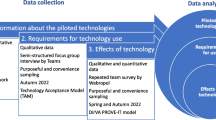Abstract
While technology is often considered a viable solution to many health related problems, its use in dementia care is still underrepresented. Although reasons for this lack of penetration may be rooted in the organisational stiffness of nursing homes, it is often the missing knowledge about daily working routines, which makes it difficult for technology providers to offer solutions that better fit the specific needs of care personnel and their patients. This article aims to shed some light on guiding principles in dementia care, the consequent challenges care workers face, and how they feel about the current and potential future use of technology to support their daily working routines. A three-stage Delphi study approach served as the methodological construct for our analysis, through which we aimed to find agreement among care workers in Luxembourg. Respective results point to six key characteristics as being central to work procedures in dementia care, i.e., (1) the application of nursing theories as the backbone for dementia care, (2) the adherence to guidelines, (3) the adaptation to patients’ individual capabilities, (4) the need for documentation and biographical work, (5) the need for effective communication, and (6) the need for flexibility. Where technology aligns with these key characteristics, it is perceived to be beneficial to the treatment of psychological as well as behavioural symptoms of dementia, to support the work in multidisciplinary teams and to help with documentation and communication.
Access this chapter
Tax calculation will be finalised at checkout
Purchases are for personal use only
Similar content being viewed by others
Notes
- 1.
Online: https://tovertafel.com/care-innovation-dementia/) [accessed: September 10th 2022].
- 2.
Online: http://www.parorobots.com/ [accessed: September 10th 2022].
References
Archibald, M.M., Barnard, A.: Futurism in nursing: technology, robotics and the fundamentals of care. J. Clin. Nurs. 27(11–12), 2473–2480 (2018)
Bächle, M., Daurer, S., Judt, A., Mettler, T.: Assistive technology for independent living with dementia: stylized facts and research gaps. Health Policy Technol. 7(1), 98–111 (2018)
Barnard, A., Sandelowski, M.: Technology and humane nursing care: (IR) reconcilable or invented difference? J. Adv. Nurs. 34(3), 367–375 (2001)
Bharucha, A.J., et al.: Intelligent assistive technology applications to dementia care: current capabilities, limitations, and future challenges. Am. J. Geriatr. Psychiatry 17(2), 88–104 (2009)
Bogue, R.: Robots in healthcare. Industr. Rob. 38(3), 218–223 (2011). https://doi.org/10.1108/01439911111122699
Butts, J.B., Rich, K.L.: Philosophies and Theories for Advanced Nursing Practice. Jones & Bartlett Publishers (2013)
Cahill, S., Macijauskiene, J., Nygård, A.M., Faulkner, J.P., Hagen, I.: Technology in dementia care. Technol. Disabil. 19(2–3), 55–60 (2007)
Castle, N.G., Ferguson, J.C.: What is nursing home quality and how is it measured? Gerontologist 50(4), 426–442 (2010)
Chaudhry, B., et al.: Systematic review: impact of health information technology on quality, efficiency, and costs of medical care. Ann. Intern. Med. 144(10), 742–752 (2006)
Colley, S.: Nursing theory: its importance to practice. Nurs. Stand. 17(46), 33–38 (2003)
Compagna, D., Kohlbacher, F.: The limits of participatory technology development: the case of service robots in care facilities for older people. Technol. Forecast. Soc. Chang. 93, 19–31 (2015)
Cooper, D.R., Schindler, P.S., Sun, J.: Business Research Methods. McGraw-Hill/Irwin, New York (2003)
Dahl, Y., Holbø, K.: Value biases of sensor-based assistive technology: case study of a gps tracking system used in dementia care. In: Proceedings of the Designing Interactive Systems Conference, pp. 572–581 (2012)
Demiris, G., Thompson, H., Lazar, A., Lin, S.: Embodied conversational agents: technologies to support older adults with mild cognitive impairment. Innov. Aging 1(Suppl 1), 1369 (2017)
Erwin, B.: Psychobiografisches Pflegemodell nach Böhm. Facultas/Maudrich (2019)
Forbes-Thompson, S., Gajewski, B., Scott-Cawiezell, J., Dunton, N.: An exploration of nursing home organizational processes. West. J. Nurs. Res. 28(8), 935–954 (2006)
Gattringer, M.: Erwin böhm: siebzig jahre und kein bisschen leise! ProCare 15(5), 6–7 (2010)
Gaugler, J.E., Anderson, K., Zarit, S., Pearlin, L.: Family involvement in nursing homes: effects on stress and well-being. Aging Ment. Health 8(1), 65–75 (2004)
Goldzweig, C.L., Towfigh, A., Maglione, M., Shekelle, P.G.: Costs and benefits of health information technology: new trends from the literature: since 2005, patient-focused applications have proliferated, but data on their costs and benefits remain sparse. Health Aff. 28(Suppl2), w282–w293 (2009)
Greenhalgh, T.: Role of routines in collaborative work in healthcare organisations. BMJ 337, a2448 (2008)
Greenhalgh, T., et al.: Beyond adoption: a new framework for theorizing and evaluating nonadoption, abandonment, and challenges to the scale-up, spread, and sustainability of health and care technologies. J. Med. Internet Res. 19(11), e367 (2017)
Hamann, D.J., Bezboruah, K.C.: Utilization of technology by long-term care providers: comparisons between for-profit and nonprofit institutions. J. Aging Health 25(4), 535–554 (2013)
Henderson, V.: The concept of nursing. J. Adv. Nurs. 3(2), 113–130 (1978)
Hennessy, D., Hicks, C., Organization, W.H., et al.: The ideal attributes of chief nurses in Europe: a Delphi study for who Europe. Technical report, Copenhagen: WHO Regional Office for Europe (2001)
Ichbiah, D., Kincaid, K.: Robots: from science fiction to technological revolution, 1st edn., p. 540. Harry N. Abrams (2005)
Jönsson, L., Wimo, A.: The cost of dementia in Europe. Pharmacoeconomics 27(5), 391–403 (2009)
Keeney, S., Hasson, F., McKenna, H.P.: A critical review of the Delphi technique as a research methodology for nursing. Int. J. Nurs. Stud. 38(2), 195–200 (2001)
Khaksar, S.M.S., Khosla, R., Chu, M.T., Shahmehr, F.S.: Service innovation using social robot to reduce social vulnerability among older people in residential care facilities. Technol. Forecast. Soc. Chang. 113, 438–453 (2016)
Kotzeva, M.: Eurostat regional yearbook 2017th edition. Technical report, Publications Office of the European Union (2017)
Lorenz, K., Freddolino, P.P., Comas-Herrera, A., Knapp, M., Damant, J.: Technology-based tools and services for people with dementia and carers: map** technology onto the dementia care pathway. Dementia 18(2), 725–741 (2019)
Maddali, H.T., Dixon, E., Pradhan, A., Lazar, A.: Investigating the potential of artificial intelligence powered interfaces to support different types of memory for people with dementia. In: Extended Abstracts of the 2022 CHI Conference on Human Factors in Computing Systems, CHI EA 2022. Association for Computing Machinery, New York (2022). https://doi.org/10.1145/3491101.3519858
McKenna, H.P.: The Delphi technique: a worthwhile research approach for nursing? J. Adv. Nurs. 19(6), 1221–1225 (1994)
Montebello, A.R., Buzzotta, V.R.: Work teams that work. Train. Dev. 47(3), 59–65 (1993)
Muller, M.J., Kuhn, S.: Participatory design. Commun. ACM 36(6), 24–28 (1993)
Munyisia, E.N., Yu, P., Hailey, D.: Does the introduction of an electronic nursing documentation system in a nursing home reduce time on documentation for the nursing staff? Int. J. Med. Inform. 80(11), 782–792 (2011)
Niemeijer, A.R., Frederiks, B.J., Riphagen, I.I., Legemaate, J., Eefsting, J.A., Hertogh, C.M.: Ethical and practical concerns of surveillance technologies in residential care for people with dementia or intellectual disabilities: an overview of the literature. Int. Psychogeriatr. 22(7), 1129–1142 (2010)
Orlewski, J.: Kollektive prägungsgeschichte und altenpflege. RBS Bull. 69 (2013)
Pulman, A., et al.: Empathy and dignity through technology: using lifeworld-led multimedia to enhance learning about the head, heart and hand. Electron. J. e-Learn. 10(3), 349–359 (2012)
Saleh, U.S.: Theory guided practice in nursing. J. Nurs. Res. Pract. 2(1), 18 (2018)
Shaw, J., Shaw, S., Wherton, J., Hughes, G., Greenhalgh, T.: Studying scale-up and spread as social practice: theoretical introduction and empirical case study. J. Med. Internet Res. 19(7), e244 (2017)
Siegel, C., Dorner, T.E.: Information technologies for active and assisted living-influences to the quality of life of an ageing society. Int. J. Med. Inform. 100, 32–45 (2017)
Testad, I., et al.: Nursing home structure and association with agitation and use of psychotropic drugs in nursing home residents in three countries: Norway, austria and england. Int. J. Geriatr. Psychiatry 25(7), 725–731 (2010)
Thompson, J., Cook, G., Duschinsky, R.: “I’m not sure i’m a nurse’’: a hermeneutic phenomenological study of nursing home nurses’ work identity. J. Clin. Nurs. 27(5–6), 1049–1062 (2018)
Thornhill, A., Saunders, M., Lewis, P.: Research Methods for Business Students. Pearson Education Ltd., Essex (2009)
Topo, P.: Technology studies to meet the needs of people with dementia and their caregivers: a literature review. J. Appl. Gerontol. 28(1), 5–37 (2009)
Ulrich, C.M., et al.: Everyday ethics: ethical issues and stress in nursing practice. J. Adv. Nurs. 66(11), 2510–2519 (2010)
Wherton, J., Greenhalgh, T., Procter, R., Shaw, S., Shaw, J.: Wandering as a sociomaterial practice: extending the theorization of GPS tracking in cognitive impairment. Qual. Health Res. 29(3), 328–344 (2019)
WHO: World report on ageing and health. Technical report, World Health Organization (2015)
Wilkes, L.: Using the Delphi technique in nursing research. Nurs. Stand. (2014+) 29(39), 43 (2015)
Zhang, N., Lu, S.F., Xu, B., Wu, B., Rodriguez-Monguio, R., Gurwitz, J.: Health information technologies: which nursing homes adopted them? J. Am. Med. Dir. Assoc. 17(5), 441–447 (2016)
Zimmerman, S., et al.: Comparison of characteristics of nursing homes and other residential long-term care settings for people with dementia (2012). http://europepmc.org/books/NBK114580
Author information
Authors and Affiliations
Corresponding author
Editor information
Editors and Affiliations
Rights and permissions
Copyright information
© 2023 The Author(s), under exclusive license to Springer Nature Switzerland AG
About this paper
Cite this paper
Monville, M., Schlögl, S., Weichelt, R., Windbichler, R. (2023). Perspectives on Technology Use in Dementia Care – An Exploratory Study of Nursing Homes in Luxembourg. In: Papadopoulos, G.A., Achilleos, A., Pissaloux, E., Velázquez, R. (eds) ICT for Health, Accessibility and Wellbeing. IHAW 2022. Communications in Computer and Information Science, vol 1799. Springer, Cham. https://doi.org/10.1007/978-3-031-29548-5_5
Download citation
DOI: https://doi.org/10.1007/978-3-031-29548-5_5
Published:
Publisher Name: Springer, Cham
Print ISBN: 978-3-031-29547-8
Online ISBN: 978-3-031-29548-5
eBook Packages: Computer ScienceComputer Science (R0)




